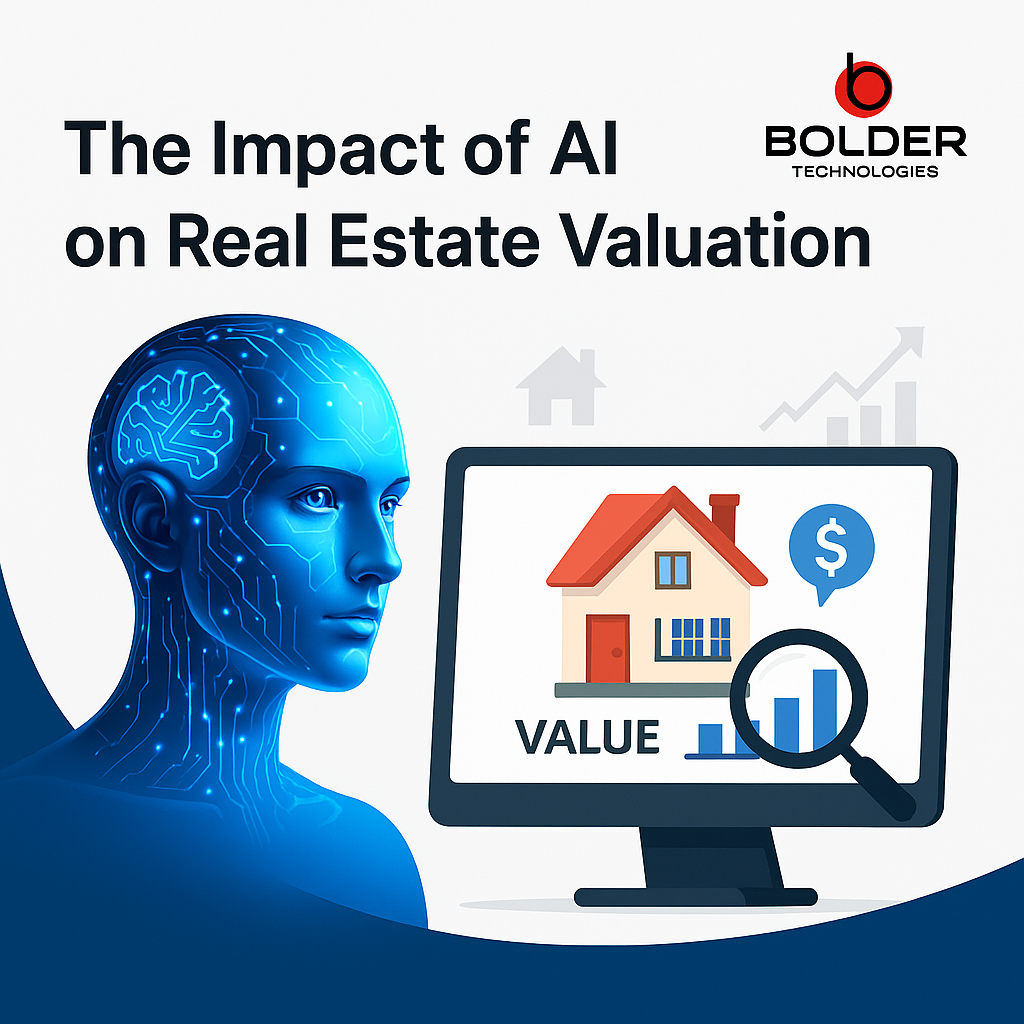Real estate valuation has traditionally been a time-consuming process that relies on human expertise and market knowledge. However, the rise of artificial intelligence (AI) is transforming how property values are assessed. With advancements in machine learning and AI property valuation, real estate pricing is becoming faster, more accurate, and less reliant on manual processes. In this blog, we will explore how AI real estate pricing and property valuation automation are reshaping the industry. We will also dive into machine learning property valuation, automated valuation models, and how real estate price prediction is becoming more reliable.
What is AI in Real Estate Valuation?
AI property valuation refers to the use of artificial intelligence to estimate the value of a property based on various factors. These factors include location, property size, market trends, historical data, and much more. AI real estate pricing models use algorithms to analyze this data and generate property values more quickly and accurately than traditional methods. These AI models often rely on real-time data pulled via APIs from various property databases.
Unlike human appraisers, AI can process massive amounts of data in a short amount of time. This allows for better decision-making when buying, selling, or investing in real estate.
Key Benefits of AI Property Valuation:
- Accuracy: AI can provide more precise property values by analyzing large datasets.
- Speed: AI models can process data and generate valuations in seconds, reducing the time it takes to assess property values.
- Objectivity: Since AI is driven by data, it eliminates human biases that may affect property valuation.
How Does AI Improve Property Valuation Automation?
Property valuation automation refers to using AI-powered tools to automatically assess the value of a property without human intervention. These systems can take into account factors like market trends, comparable property prices, and other influencing variables to calculate the property’s value.
AI tools use algorithms to predict the future market trends and adjust property values accordingly. This ensures that property valuations remain current and aligned with market shifts.
Advantages of Property Valuation Automation:
- Faster Decision Making: Automation speeds up the property valuation process, enabling faster transactions and decisions.
- Cost-Effective: Reduces the need for human appraisers, lowering the overall cost of property valuations.
- Consistency: Automated systems can provide consistent valuations, reducing the risk of errors or oversight.
Machine Learning and Property Valuation
Machine learning property valuation is a subset of AI that uses algorithms to learn from historical data and improve over time. The more data these systems process, the better they become at predicting accurate property values.
By analyzing data such as past property sales, economic trends, and neighborhood developments, machine learning models can identify patterns and relationships that human appraisers might miss. This makes the valuation process more precise, especially in markets where traditional methods may struggle to account for every variable.
How Machine Learning Enhances Property Valuation:
- Data-Driven Insights: Machine learning allows for continuous data analysis and improves over time.
- Adaptability: As the real estate market evolves, machine learning models can adapt to new trends and conditions.
- Predictive Analysis: Machine learning enables accurate real estate price prediction, allowing buyers, sellers, and investors to make informed decisions.
Automated Valuation Models (AVMs) in Real Estate
An automated valuation model (AVM) is a tool that uses mathematical models to assess the value of a property. AVMs use data from public property records, MLS listings, and tax assessments to provide an estimated property value. The value is based on factors like location, size, and comparable properties in the area.
AVMs are powered by AI and machine learning algorithms that continuously improve their accuracy as they process more data. This makes AVMs a reliable source for property valuations, especially for investors or lenders who need quick estimates.
Seamless API integration ensures AVMs have access to the latest data, making valuations more accurate and reliable.
Key Features of Automated Valuation Models:
- Speed: AVMs can provide property valuations in real-time, making them ideal for quick decisions.
- Consistency: They use data-driven methods to ensure consistent property evaluations.
- Cost-Effective: AVMs are more affordable than traditional appraisals, reducing the cost for real estate professionals and investors.
Real Estate Price Prediction with AI
Real estate price prediction using AI models is another area where technology is making waves. AI can predict future property values by analyzing historical data, market trends, economic factors, and demographic shifts. These predictions help property owners, buyers, and investors make better-informed decisions about when and where to buy or sell properties.
AI models can consider factors that are difficult for humans to analyze, such as subtle market trends and economic shifts that influence property prices over time.
Benefits of AI in Real Estate Price Prediction:
- Long-Term Forecasting: AI models can predict real estate prices months or even years in advance.
- Market Insights: By analyzing trends, AI helps stakeholders identify profitable areas for investment.
- Improved Investment Decisions: Accurate price predictions reduce the risk for investors and increase their chances of success.
The Role of AI in Enhancing Real Estate Valuations
AI is revolutionizing real estate valuations by offering faster, more accurate, and data-driven results. Whether it’s through AI property valuation, machine learning property valuation, or automated valuation models, AI is transforming the way properties are priced.
For real estate professionals, this means less reliance on outdated methods and the ability to make faster, more informed decisions. For buyers and sellers, AI offers transparency and accuracy in pricing, ensuring they get fair deals in the marketplace.
Key Takeaways for Property Owners:
- Better Pricing Accuracy: AI and machine learning models provide more accurate property prices by analyzing data in real-time.
- Faster Transactions: Property valuation automation speeds up the entire process, allowing for quicker buying or selling decisions.
- Improved Investment Opportunities: AI-driven real estate price prediction gives investors a competitive edge by forecasting trends and identifying high-growth areas.
Challenges and Limitations of AI in Property Valuation
Despite the benefits, AI and machine learning in property valuation are not without their challenges. Some of the key limitations include:
- Data Quality: AI models are only as good as the data they are trained on. If the data is incomplete or inaccurate, it can lead to incorrect property valuations.
- Market Complexity: While AI can analyze large datasets, it may struggle to predict property values in complex or highly fluctuating markets.
- Regulatory Concerns: In some regions, there may be regulatory issues related to the use of AI in property valuation, especially regarding data privacy.
How API Integration Powers AI in Real Estate Valuation
While AI models are at the heart of smart property valuations, APIs are the pipes that keep them running. API integration enables real estate platforms to connect with multiple data sources like MLS listings, property tax records, CRM tools, and historical market data.
AI needs real-time, structured, and diverse data to deliver accurate valuations. APIs help automate the flow of this information, allowing AI models to analyze the latest data without manual effort. Whether you’re building an automated valuation model or using machine learning for pricing predictions, a robust API integration is essential for speed, scalability, and accuracy.
Conclusion
In conclusion, AI property valuation and property valuation automation are transforming the real estate industry by making property pricing faster, more accurate, and data-driven. Whether it’s through machine learning property valuation, automated valuation models, or real estate price prediction, AI is helping property owners, investors, and real estate professionals make better decisions. While there are some challenges to overcome, the future of property valuation looks bright with the continued advancement of AI.
If you’re looking to leverage AI for real estate pricing or improve your property valuation process, Bolder Technologies can help with seamless API integration to power your AI systems. Contact us today to explore how we can support your real estate business with smart, connected solutions.
Need Help Integrating APIs?
Let us handle the tech so you can focus on growing your business.
🚀 Book a Free Consultation
